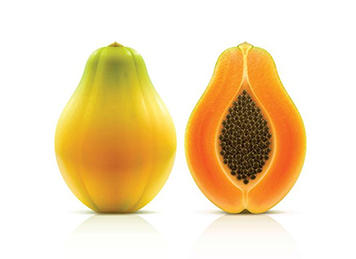
| Aug. 2017 | |||||||||||
| Top stories | |||||||||||
| In the news | |||||||||||
| Photos | |||||||||||
| Contact us | |||||||||||
| Archive | |||||||||||
|
Iowa cases part of Salmonella outbreak |
Sept. 5, 2017 --
An outbreak of Salmonella linked to a variety of papayas has sickened 173 people in 21 states, including two in Iowa, according to the CDC. One death has been reported in New York City and 58 people have been hospitalized, as of Aug 18.

The FDA reported five strains of Salmonella have been found in Maradol papayas from the Carica de Campeche farm in Mexico. Health officials identified the farm as the likely source of the outbreak, and advised that no papayas from the farm should be eaten, including Caribeņa, Cavi and Valery brands. Additional brands may be identified as the FDA and CDC continue their joint investigation in collaboration with state and local public health agencies.
The multistate outbreak was first identified as a Salmonella Kiambu cluster linked to papayas sold in a Baltimore store. An advanced molecular detection technique known as whole genome sequencing confirmed that the strain of Salmonella in the papayas matched the strains in specimens from patients who ate the fruit.
The strains of Salmonella found in the papayas and in patient specimens are Kiambu, Thompson, Agona, Senftenberg and Gaminara.
Most people infected with Salmonella develop diarrhea, fever and abdominal cramps between 12 and 72 hours after infection. The illness usually lasts 4 to 7 days, and most individuals recover without treatment. In some cases, diarrhea may be so severe that the patient needs to be hospitalized. In these patients, the Salmonella infection may spread from the intestines to the blood stream and then to other body sites. In these cases, Salmonella can cause death unless the person is treated promptly with antibiotics. The elderly, infants and those with impaired immune systems are more likely to have a severe illness.